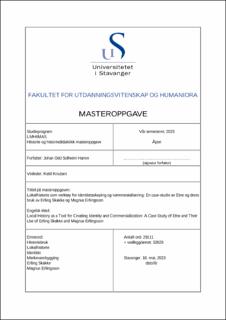| dc.contributor.advisor | Knutsen, Ketil. | |
| dc.contributor.author | Hamre, Johan. | |
| dc.date.accessioned | 2023-06-30T15:51:12Z | |
| dc.date.available | 2023-06-30T15:51:12Z | |
| dc.date.issued | 2023 | |
| dc.identifier | no.uis:inspera:146752593:12318829 | |
| dc.identifier.uri | https://hdl.handle.net/11250/3074747 | |
| dc.description.abstract | Sammendrag
Lokalhistorie har gjennom 1900-tallet, og særlig siden 60-tallet vært et felt under sterk utvikling. Norge, et land som i 2020 besto av 356 kommuner som alle har en egen lokalhistorie, er fullt av lokalhistoriske fortellinger. Disse historiene er i et globalsamfunn i sterk vekst blitt særlig viktige i lokalsamfunns egen identitetsskaping og merkevarebygging. Historiebruksfeltet kommer her inn som et viktig verktøy.
Med Klas-Göran Karlssons historiebrukstypologier som teoretisk inspirasjon har jeg undersøkt hvordan kommersiell og lokalidentitetsskapende historiebruk kommer til uttrykk i Etne kommune i Vestland fylke. Historiebrukskategorien «eksistensiell historiebruk» har blitt endret til «lokalidentitetsskapende historiebruk» ettersom jeg så det som et mer treffende begrep i forsøket på å besvare denne oppgavens problemstilling: «Hvordan bruker Etne historie kommersielt og identitetsskapende?».
Forskningsprosjektet baserer seg på en kvalitativ tilnærming. Analyse av empirisk materiale i form av «Etne-soga», årbøker, «Skakkelaks.no» og bygning-, gruppe- og stedsnavn i Etne har blitt gjort i lys av historiebrukskategoriene. Gjennomgående i empirien er to sentrale historiske skikkelser i Etnes lokalhistorie, Erling Skakke og Magnus Erlingsson. Disse har vist seg å være mye brukt i historiebruken i bygda, og dermed også i denne oppgaven.
Gjennom analysen av det empiriske materialet ble det klart at Skakke og Erlingsson har vært sentrale i den lokale identitetsskapingen som videre har ført til et kommersielt potensial. En tydelig positiv fremstilling av både Skakke og Erlingsson i empirien har gjort de til gjenstand for en klar historiebruk i Etne. Bygda har brukt lokalhistorien aktivt for å skape identitet og markedsføre seg selv med hjelp av en unyansert fremstilling av egen, men også Norges historie. | |
| dc.description.abstract | Abstract
Local history has undergone significant development throughout the 20th century, and especially since the 1960s. Norway, a country which in 2020 consisted of 356 municipalities which all had their own local history, is full of local history stories. These stories are in a global society which is rapidly growing, becoming especially important in local communities own identity creation and branding. The field of history usage plays here an important role as a tool.
With Klas-Göran Karlssons history use typologies as theoretical inspiration I have studied how commercial and local identity creating historical usage are expressed in the municipality of Etne in Vestland county. The historical usage category “existential historical usage” has been changed to “local identity creating historical usage” as I see it as a more accurate term in this thesis attempt to answer its research question: “How does Etne utilize history commercially and to create identity?”.
The research project is based on a qualitative approach. Analysis of empirical material in the form of “Etne-soga” (the local history book), local history books, “Skakkelaks.no” (local website) and building-, group- and names of specific places in Etne have been conducted in light of the historical usage categories. Through all of the empirical material we se two historical characters in Etnes own local history, Erling Skakke and Magnus Erlingsson. They have proven to be widely used in the historical usage within Etne, and therefore also in this thesis.
Through the analysis of the empirical material, it became very clear that Skakke and Erlingsson have been important in the local identity creation which has further led to a commercial potential. A clearly positive description of both Skakke and Erlingsson in the empirical material have made them object of a clear historical usage in Etne. Etne has used local history actively to create identity and to promote them selves with the help of a rather unvarnished representation of one’s own, as well as Norways history. | |
| dc.language | nob | |
| dc.publisher | uis | |
| dc.title | Lokalhistorie som verktøy for identitetsskaping og kommersialisering: En case-studie av Etne og deres bruk av Erling Skakke og Magnus Erlingsson | |
| dc.type | Master thesis | |
